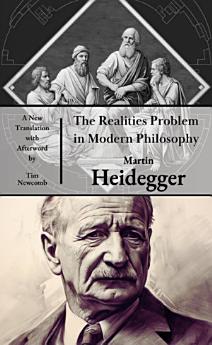The Realities Problem in Modern Philosophy
მაი. 2024 · The Collected Early Works of Martin Heidegger წიგნი 6 · Minerva Heritage Press
ელწიგნი
76
გვერდი
family_home
მისაღები
info
reportრეიტინგები და მიმოხილვები დაუდასტურებელია შეიტყვეთ მეტი
ამ ელწიგნის შესახებ
A new translation of Heidegger's early work "The Realities Problem in Modern Philosophy '', originally published in 1912 under the German title "Das Realitats Problem in der Modernen Philosophie". This edition contains a new afterword by the Translator, a timeline of Heidegger's life and works, a philosophic index of core Heideggerian concepts and a guide for Existentialist terminology across 19th and 20th century Existentialists. This translation is designed for readability and accessibility to Heidegger's enigmatic and dense philosophy. Complex and specific philosophic terms are translated as literally as possible and academic footnotes have been removed to ensure easy reading. This work is critical to understand his initial approach to Ontochronology, leading to his advanced theories on the Phenomenology of Time in his major work "Being and Time". Heidegger argues here that time in the historical sciences is not a homogeneous, mathematical series as it is in physics, but rather a qualitative, context-dependent concept. He emphasises the importance of understanding time in relation to the specific aims and methodologies of historical science, and posits that time in history has a unique meaning and function, deeply bound up with the cultural and human context of historical events. This approach reflects a broader philosophical inquiry into the nature of being and temporality that Heidegger would develop in his later works. Metaphysics has triumphed over Rationalism and Empiricism as the only field that is vectored towards "the only question that matters".
ავტორის შესახებ
Martin Heidegger (1889-1976) was a German philosopher and one of the most influential thinkers of the 20th century, particularly in the fields of phenomenology, existentialism and Ontochronology. His seminal work, Being and Time (Sein und Zeit), introduces the concept of "Dasein," or "being-there," as a way to explore the nature of human existence, focusing on temporality and the meaning of being. Heidegger challenged traditional Western metaphysics by emphasizing the situatedness of human beings within their world, a concept he described as "being-in-the-world." Though his brief association with the Nazi party has cast a shadow over his legacy, Heidegger's ideas have profoundly impacted disciplines such as philosophy, psychology, literature, and theology. His critiques of technology and "technological thinking" continue to resonate in contemporary discussions on modernity, alienation, and the essence of human existence.
შეაფასეთ ეს ელწიგნი
გვითხარით თქვენი აზრი.
ინფორმაცია წაკითხვასთან დაკავშირებით
სმარტფონები და ტაბლეტები
დააინსტალირეთ Google Play Books აპი Android და iPad/iPhone მოწყობილობებისთვის. ის ავტომატურად განახორციელებს სინქრონიზაციას თქვენს ანგარიშთან და საშუალებას მოგცემთ, წაიკითხოთ სასურველი კონტენტი ნებისმიერ ადგილას, როგორც ონლაინ, ისე ხაზგარეშე რეჟიმში.
ლეპტოპები და კომპიუტერები
Google Play-ში შეძენილი აუდიოწიგნების მოსმენა თქვენი კომპიუტერის ვებ-ბრაუზერის გამოყენებით შეგიძლიათ.
ელწამკითხველები და სხვა მოწყობილობები
ელექტრონული მელნის მოწყობილობებზე წასაკითხად, როგორიცაა Kobo eReaders, თქვენ უნდა ჩამოტვირთოთ ფაილი და გადაიტანოთ იგი თქვენს მოწყობილობაში. დახმარების ცენტრის დეტალური ინსტრუქციების მიხედვით გადაიტანეთ ფაილები მხარდაჭერილ ელწამკითხველებზე.











